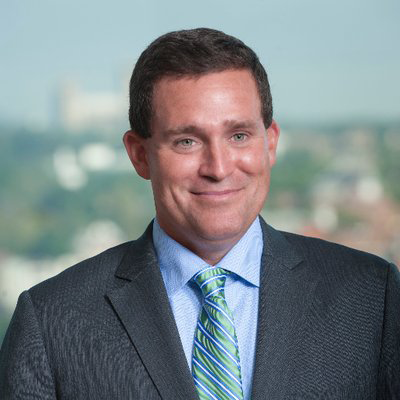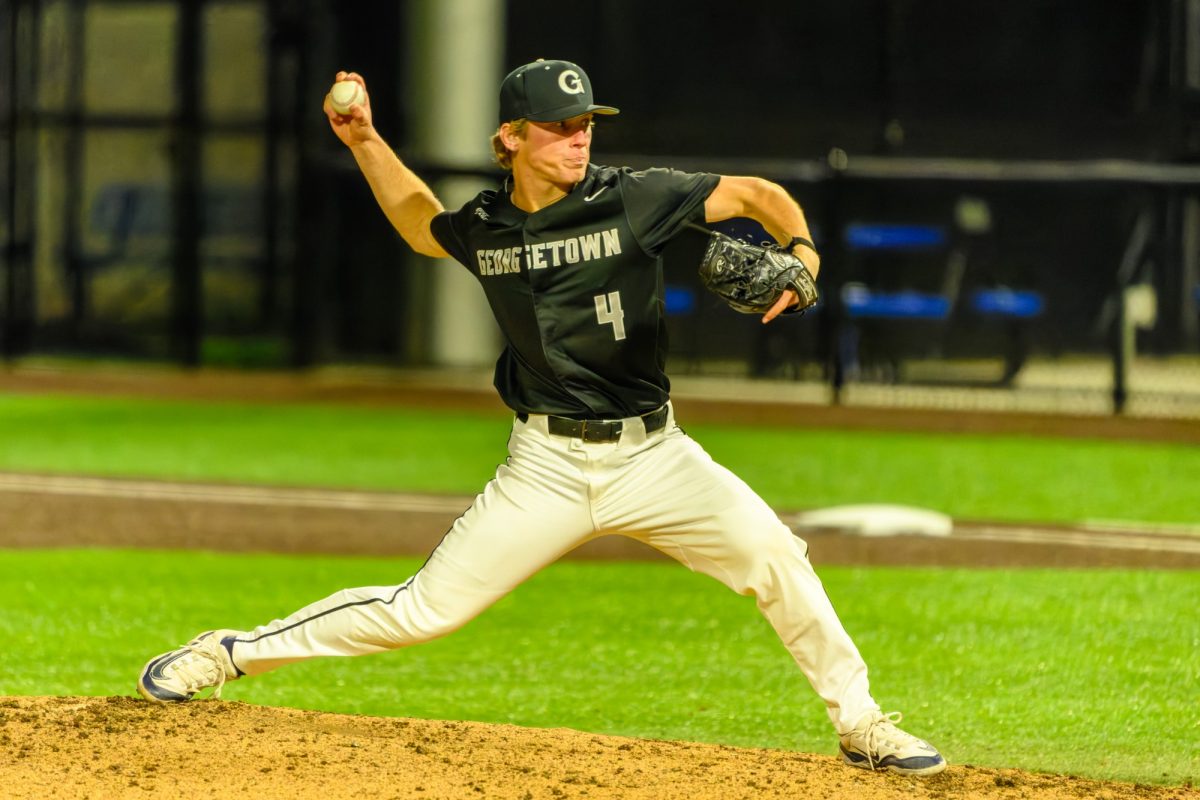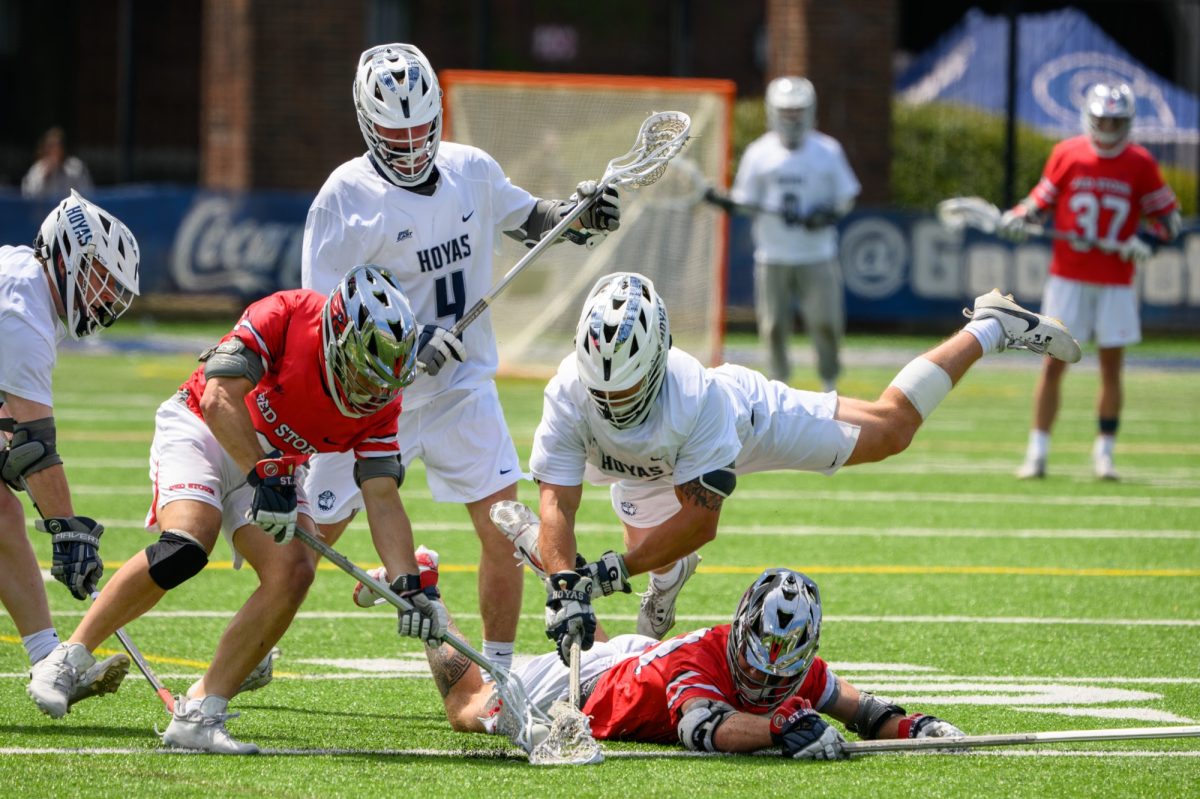When the Georgetown men’s soccer team took home its first NCAA championship in December 2019, among the 8,400 fans cheering in the stands was Dan Helfrich (SFS ’98, GRD ’99). Helfrich, a Hoya soccer graduate, has worked as a play-by-play commentator for the Hoyas for nearly fifteen years, calling every home game during his career. When Helfrich is not calling games and cheering on the Hoyas at Shaw Field, he can be found across the Francis Scott Key Bridge at the Rosslyn, Va. headquarters for Deloitte Consulting, where he serves as chairman and CEO.
Helfrich began playing for the Hoyas in 1994, on the first men’s soccer team in Georgetown’s history to make the NCAA tournament. During his senior season in 1997, the team achieved their first tournament victory.
Helfrich began his career at Deloitte immediately after graduating from Georgetown University in 1998 with a degree in international economics. During his more than 20 years at Deloitte Consulting, Helfrich has led Deloitte’s Government & Public Services practice and served as Deloitte’s chief strategy officer for Human Capital. In the wake of the Sept. 11 attacks, Helfrich led teams that assisted the government in developing the Transportation Security Administration. He was named CEO and chairman of Deloitte Consulting in April 2019 and currently leads Deloitte Consulting’s team of 50,000 employees.
Throughout his tenure with the company, Helfrich has remained an avid Hoya soccer fan and the team’s primary play-by-play commentator, covering hundreds of games alongside former teammate Tom Greaser (MSB ’98). The Hoya spoke with Helfrich in a phone interview about his career both professionally and as a soccer broadcaster and where he sees Georgetown’s team headed this season.
When describing his leadership style in interviews, Helfrich says he tries to embody being “a captain, and not a coach.” He says this creed reminds him to lead by example and not to be arrogant as a leader.
Q: I’ve read your mantra on leadership — “be a captain, not a coach” — could you elaborate upon what this means to you, and how you apply this to your professional life as a CEO?
A: Captains lead in a way that is about connecting with and motivating people, not about directing employees. That’s, to me, everything I want from my team. They recognize that they’re ultimately going to influence the behavior of others and the performance of their organization by motivating and inspiring people, not by using power and not by using authority. Coaches have, at times, more of a power or authority-centric view of leadership, and captains realize they’re just one of the team and have to lead in that way.
Q: What are some of your favorite memories from your time as a Georgetown soccer player and student?
A: It was certainly one of the favorite times of my life. As a student athlete, I have memories that are as a fan: seeing Allen Iverson dunk over Rudy Johnson in a UConn game when we used to play over at the Capital Centre over in Maryland — it was an incredible memory. As a soccer player, I played on the first two teams ever in Georgetown history to make the NCAA Tournament in 1994 and 1997. In 1994, we played at home against Maryland in front of 6,000 fans on campus, which was exhilarating. In 1997, we were the first team ever to win an NCAA Tournament game when we beat Virginia Commonwealth University.
And as a student, what I loved about Georgetown is frankly what I love about Deloitte and the team I’m on today: It is a down to Earth, non-arrogant, very diverse group of people who are trying to pursue a common goal, and for me that’s an incredible place to spend four years, and I find a lot of those same things in my current role.
Q: What was fan participation like when you were a student, and how have you seen it evolve over the years?
A: Georgetown, in all sports, I think has one consistency, that we love winners. And if you were to map the attendance and the rate of enthusiasm for basketball, you would be able to map it to the success of the program in that year or in that moment. And the same was true and is true for the soccer team. There have been major ebbs and flows in the campus excitement and in attendance over the 27 years that I’ve been associated with the program. It’s been significant fluctuations.
Last year was obviously incredibly special, and the support in the Washington game that got us to the final eight, the support of people who went down to North Carolina for the Final Four, was absolutely a factor in why we won those three games. The students and the alumni and the community folks who participated in those games in particular all have a little piece of our national championship.
Q: What principles did you take from the soccer pitch to Deloitte?
A: Humility — the recognition that to succeed, you surround yourself with people who are both different than you and better than you at certain things. Certainly, in my time at Georgetown, I was never the best player, and I always found a way to learn from those who were better. I always found a way to put myself in positions on the field where I could maximize my contributions.
And then this point around diversity — I think a very underrated point about what being a college athlete prepares you for in the workforce. I mean, if I think back to my Georgetown team, you had racial diversity, you had actually really good socioeconomic diversity, you had many countries represented on the team, and learning how to knit together a high-performing team and a culture with people who look and think differently is what makes a great athletic team. And in my mind, as I try to fill teams at Deloitte, those same ingredients have paid off.
And, look, on a soccer field, it’s 25 or 30 people. In my current role, my team is more than 50,000 people, but the principles are actually remarkably similar.
Q: Who are some of the people who best embody this principle of captain versus coach in the professional world? On Georgetown’s soccer team? When you think about that concept, who do you think is a good candidate to step in and fill that role this fall?
A: I’ve been talking about captains versus coaches for a while, and then I just discovered a great book that Wall Street Journal writer Sam Walker wrote called “Captain Class,” which does a lot of research about sports captains and their success and then makes parallels to the workforce. So, anyone interested in the concept, it’s a great read. I certainly do not have a single role model that I would say embodies in the business world everything that it is about a captain. I’m trying to make that happen. One of the beautiful things about the national championship team — and I believe about this upcoming season’s team, whenever that season takes place — is they are a richness of people who have that captain mentality, even if they don’t wear the armband.
I think of someone like Sean Zawadzki, who was a critical piece of last year’s team, and I think he embodies that in incredible ways. I think Sean O’Hearn embodies that in so many ways. I think Rio Hope-Gund embodies that in so many ways. I think the program is on very good footing for a long time to come, because [Head Coach] Brian [Wiese] and the staff have figured out how to recruit people with that mentality, and I think that’s the recipe for how you keep a program going for decades at a high level versus have fits and starts of great teams with sort of mediocrity in between.
Q: When did you start broadcasting, and what inspired you to start commentating?
A: I started taping myself broadcasting games when I was eight or nine years old, and I had a career aspiration for a long time to be in sports journalism or sports broadcasting. I actually lived in middle school and high school 15 miles from ESPN headquarters in Connecticut. I got to know ESPN pretty well in that time. I probably had a chance to start a career in broadcasting coming out of Georgetown and actually made the decision that some thought was crazy to join Deloitte versus going down the broadcasting route.
But that passion I’ve had for broadcasting games, in particular for play-by-play, has been with me since an early age, and when streaming became available 15 years ago — very early, rudimentary streaming — and Georgetown decided to broadcast games, I was there on day one to say, “Let me do it.” Tom Greaser, who was a fellow ’97 team member of mine and my best friend who also lives in the area, who was one of the top-10 goal scorers in Georgetown history, was there with me, so we formed a partnership 14 years ago that was based on a friendship, and the rest was history.
We’ve probably broadcast, I guess it must be a couple hundred games since then, and it’s something we put a lot of time and effort into to try to get better. My retirement plan is to exit from Deloitte whenever that time is right and move into broadcasting with a greater percentage of my time.

Q: How do you balance the business of your life between juggling work, commentating and your family?
A: There isn’t time for much else. It is absolutely a demanding career and a demanding responsibility to lead a company of our size and a team of our size. I have 11-, 12-, 15- and 16-year-old kids at home, and being an active, day-to-day part of their lives is incredibly important to me.
And then from Labor Day until the winter holidays, Georgetown soccer gets to a very high point in my priority list, and the great thing about it is, I am very open with my work life about how important Georgetown soccer is to me. And so, in many ways, I’m trying to set an example for all of my employees that having a balanced, fulfilling life outside of work is a recipe for professional success. I hope I give them some encouragement to do that.
And then, from the family side, my wife and my four kids are as passionate and involved in Georgetown soccer as I am, so Georgetown becomes a part of not just me, it’s a part of all six of us. Every year, when we advance to the Sweet Sixteen, we host the entire team and staff at our house for Thanksgiving, and moments like that are highlights of my family’s entire life. I get the question all the time and have people looking at me like I’m crazy to try to accomplish all of these things at once, and to me they actually knit together much better than people would think.
Q: How did the tradition of Thanksgiving with the team at your house get started?
A: It’s an interesting thing, and I experienced it as a player. You have to win at least one game in the NCAA Tournament to have a game the Saturday after Thanksgiving, and I remember going to a Thanksgiving buffet at the Key Bridge Marriott when I was a player. Thanksgiving is a favorite holiday of mine, and I remember the Key Bridge Marriott experience not matching my definition of a Thanksgiving experience, which is playing outside and relaxing on the couch and watching football and things.
So, as soon as we were under Brian’s leadership and started getting into the NCAA tournament, it was an obvious offer for me to make, and the team has embraced it fully. It’s everything about a Thanksgiving that I love and Brian loves, it just happens to be 50 people eating 30 to 50 pounds of protein, as opposed to a dozen. Those boys eat a lot, so you have to give good variety. We cooked beef tenderloin. Actually, there are a bunch of vegans and vegetarians on the team, so we try to make sure there are a wide variety of vegan and vegetarian options as well.
Q: Are any of your kids also soccer players?
A: All four are, and my two high schoolers are certainly on a path to playing in college. And the two younger ones are certainly talented and love the game too. We encourage our kids to try lots of different sports, and they did. My wife was a collegiate gymnast at George Washington University, but all four of them gravitated towards soccer.
Q: The team got their first NCAA tournament win during your senior year at GU. What was it like beginning a culture of excellence in Georgetown soccer and seeing it come to fruition today? What was it like experiencing the national championship game firsthand?
A: The journey from the mid-’90s to last year I would call surreal, and full of pride because I’ve been able to be hands-on involved — obviously in different capacities — for all 27 of those years. And to see the bricks laid in the foundation — and the literally thousands of people who have a hand in those bricks being laid resulting in the moment last year — is a really cool perspective to have on that journey.
In terms of last year and the Final Four, I will tell you that I would’ve rather been broadcasting. I actually love experiencing the game while broadcasting. It’s intellectually interesting and it’s less stressful, and so that was a different experience to not be able to broadcast. But being on the field after the game — I was fortunate enough to be able to access the field seconds after we won — and being able to be part of the embrace, both figurative and literal, with staff and players, people that have meant a lot to me and my family, those are memories that are irreplaceable. I believe that this will certainly not be our last national championship. And I believe — I’m actually pretty objective about these things — I believe Georgetown has a top-three combined men’s and women’s soccer program in the country. And to be able to say that is unthinkable, relative to where we were in the mid-’90s.
Q: What has allowed Georgetown soccer to experience this success?
A: I think we have the best coach in the country, and I think he’s the best coach in the country because he’s a triple threat: He’s an outstanding recruiter, he’s an outstanding tactician soccer-wise and he’s an outstanding person and leader. And when you have the best coach in the country running your program, then a lot of things follow from that. And then you can’t win great championships without great players, and there’s no doubt that we’ve been blessed with great players. And the intersection of those two things is the unselfishness that embodies a 25- to 30-person roster where no one’s playing as much as they want to, and so to me, that’s the answer. But the simplest answer is, we have the best coach in the country.
Q: What other Georgetown sports do you follow? What can other Georgetown teams learn from men’s soccer?
A: Oh, I follow all of them. I think even though [Georgetown women’s soccer Head Coach] Dave Nolan and Brian are very different people and have very different personalities, there’s a lot about the way they run their programs that is similar. They’re both extremely selfless and create a culture and an atmosphere that is friendly and loose. I think there are teams at Georgetown and programs at Georgetown that take themselves too seriously and don’t have this sweet spot of culture that Dave and Brian have helped build in the soccer programs. That being said, I said Brian is the best soccer coach in the country. I think Lee Reed is one of the top athletic directors in the country, and I am very on board with the general direction of Georgetown athletics.
Q: What does the team need to do going forward to maintain the standard of excellence and remain a strong competitor for years to come?
A: What I always think about with both sports teams that are high-performing and companies that are high-performing, you have to every year find new. And so you have to find new traditions, you have to find new practice habits, you have to find new music that you like to listen to, you have to find new drills that you run in practice, you have to find new players that have a different style than the one you had before. Because what happens if you don’t add enough new into the mix, then complacency sets in and others innovate around you. I think the key for the next five years is: How do you take what’s great and then add enough dashes of new into the recipe that we continue to elevate?
















Joe Rudy • Jun 4, 2020 at 3:09 pm
Great interview!
Watching our son & GU soccer -listening to Dan & Tom were the best!
Dan is what being a “Hoya” is all about!
Lisa Rist • May 22, 2020 at 12:09 pm
What a great story and a great guy! We have had the honor of knowing Dan and calling him our friend after our son played on the Georgetown soccer team in the 2011-2014 years! He is a tremendous amabassador for the team and a fantastic role model for all the players in how he has conducted his life post-Georgetown! So grateful for all he does and how he supports the kids, coaches and entire program!